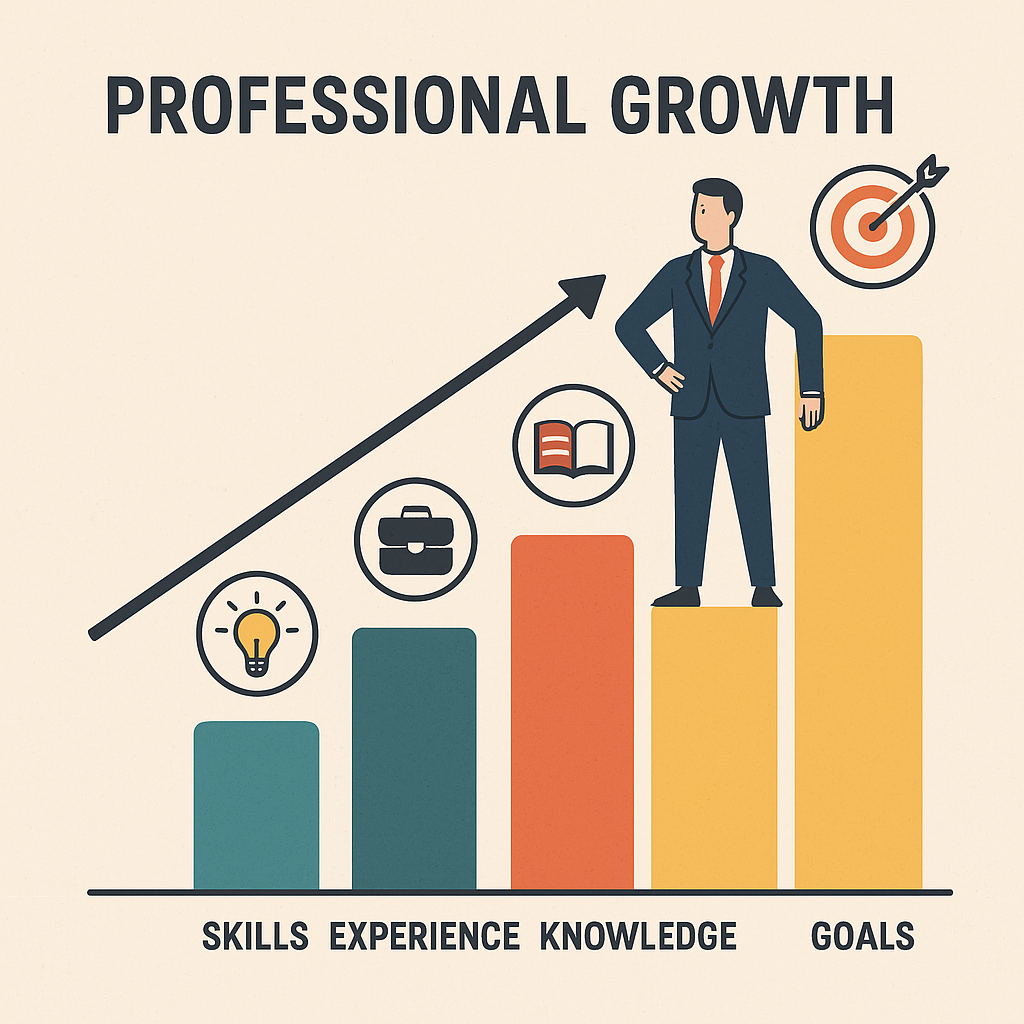The Path to Professional Growth: Strategies for Lifelong Career Development

Here’s a lengthy, well-structured article on professional growth, suitable for academic, business, or personal development contexts:
Discover practical strategies for achieving professional growth and long-term career success. Learn how to develop your skills, overcome challenges, and adapt in today’s fast-paced work environment.

What Is Professional Growth?
Professional growth refers to the advancement of your knowledge, skills, and experience in your career over time. It encompasses both tangible aspects (such as acquiring new qualifications, promotions, or salary increases) and intangible elements (like leadership, critical thinking, emotional intelligence, and work ethics).
It is a journey that requires intentional effort, reflection, and adaptability.
Key Components of Professional Growth
1. Continuous Learning
One of the cornerstones of professional growth is the pursuit of lifelong learning. Whether through formal education, workshops, certifications, or online courses, the willingness to acquire new knowledge ensures you remain relevant in your field.
-
Formal education: Pursuing degrees or professional certifications.
-
Informal learning: Podcasts, webinars, YouTube tutorials, and reading industry blogs.
-
On-the-job learning: Learning through experience, feedback, and observation.
“Once you stop learning, you start dying.” – Albert Einstein
2. Skill Enhancement
Your technical and soft skills are the tools you use every day. Improving these ensures efficiency and adaptability.
-
Hard skills: Technical abilities like data analysis, programming, accounting, etc.
-
Soft skills: Communication, leadership, conflict resolution, and time management.
3. Goal Setting
Without clear goals, professional growth can become stagnant and directionless.
A well-defined goal acts as a compass, guiding your development and keeping you motivated. These goals should be SMART:
-
Specific
-
Measurable
-
Achievable
-
Relevant
-
Time-bound
Examples:
-
“Complete a project management certification within the next 6 months.”
-
“Improve public speaking skills by joining a Toastmasters club.”
Setting both short-term and long-term goals gives you clarity and motivation, ensuring that each step you take contributes to your larger vision.
4. Networking and Relationship Building
No one grows in isolation. Building a network of mentors, peers, and professionals in your field opens doors to opportunities and insights.
Ways to build your network:
-
Attend industry conferences and seminars
-
Engage on LinkedIn and other professional platforms
-
Join associations or local meetups
-
Volunteer or collaborate on projects
Professional relationships can offer mentorship, feedback, job referrals, and even partnerships. As the saying goes: “Your network is your net worth.”
5. Embracing Feedback
Growth requires introspection and the courage to accept feedback—both positive and constructive.
-
Seek feedback regularly from supervisors, colleagues, and clients
-
Treat criticism as a tool for improvement, not a personal attack
-
Reflect and act upon feedback to refine your approach
Professionals who seek out and embrace feedback are often the ones who advance the fastest.
6. Emotional Intelligence and Self-Awareness
Technical skills can get your foot in the door, but emotional intelligence (EQ) determines how far you go. EQ includes:
-
Self-awareness
-
Empathy
-
Motivation
-
Social skills
-
Self-regulation
Cultivating EQ helps in leadership, conflict resolution, teamwork, and decision-making. It builds trust, improves workplace relationships, and boosts overall performance.
7. Leadership and Initiative
Leadership isn’t about having a title—it’s about influence. Taking initiative and leading by example demonstrates your commitment to growth and excellence.
Traits of a growth-oriented leader:
-
Takes responsibility
-
Inspires others
-
Seeks innovation
-
Supports and uplifts colleagues
-
Makes ethical decisions
Even in a non-leadership role, exhibiting these qualities enhances your value and visibility.
8. Resilience and Adaptability
Setbacks are inevitable. Resilience enables you to recover, adapt, and keep progressing. In today’s volatile world, adaptability is no longer optional—it’s a core professional skill.
How to build it:
-
View challenges as learning opportunities
-
Stay open to change and innovation
-
Keep a growth mindset: believe that skills and intelligence can develop over time
9. Time Management and Productivity
Managing your time effectively ensures you can focus on priorities and reduce stress. Key techniques include:
-
Prioritizing tasks using methods like Eisenhower Matrix
-
Time blocking
-
Avoiding multitasking
-
Taking breaks to recharge
-
Using digital tools like Trello, Notion, or Asana
Consistently managing your time well enhances your reliability and success rate at work.
10. Work-Life Balance
Professional growth doesn’t mean burnout. Sustainable growth requires balance—nurturing your mental, physical, and emotional health alongside your career.
Tips to maintain balance:
-
Set boundaries between work and personal life
-
Take regular breaks and vacations
-
Invest in hobbies and relationships
-
Practice mindfulness or meditation
A well-balanced professional is more creative, focused, and productive.
Benefits of Professional Growth
The payoff of continuous development is immense. It leads to:
-
Career advancement and new job opportunities
-
Increased confidence and self-esteem
-
Higher earning potential
-
Greater job satisfaction and engagement
-
Long-term security in a dynamic job market
More importantly, it cultivates a sense of purpose, fulfillment, and legacy.
How Employers Can Support Professional Growth
Organizations also benefit when employees grow. Forward-thinking companies:
-
Offer training and development programs
-
Encourage mentorship and coaching
-
Recognize and reward growth
-
Provide growth-oriented feedback
-
Promote from within
When businesses invest in people, productivity, retention, and innovation thrive.
Final Thoughts
Professional growth is not a one-time event—it’s a mindset and a lifestyle. Whether you’re just starting out or decades into your career, the quest to evolve never truly ends.
Each course you take, connection you build, or challenge you overcome adds a new layer to your potential. In a world where change is the only constant, professional growth is your greatest asset.
If you’re ready to begin or accelerate your journey, ask yourself:
-
Where am I now?
-
Where do I want to be?
-
What skills or habits will get me there?
-
Who can support me along the way?
Start small, stay consistent, and never stop learning. Your best professional self is still ahead of you.
Conclusion
Professional growth is not a destination—it’s a continuous journey of self-improvement, learning, and adaptation. In a dynamic global economy, those who commit to developing themselves professionally will not only remain relevant but thrive. Whether you’re just starting your career or are an experienced professional, the key to growth lies in being proactive, intentional, and resilient. By cultivating a growth mindset and taking consistent action, you can unlock your full potential and make a lasting impact in your field.















